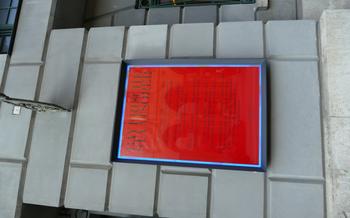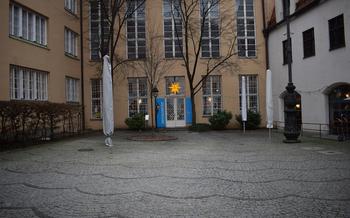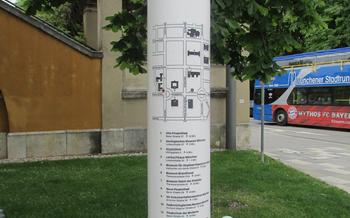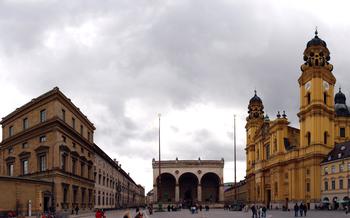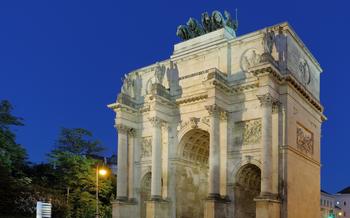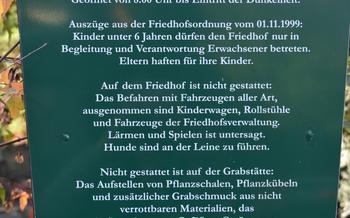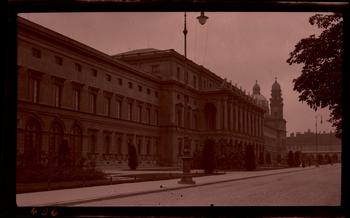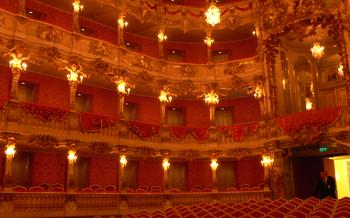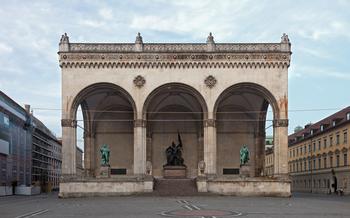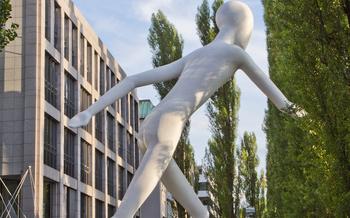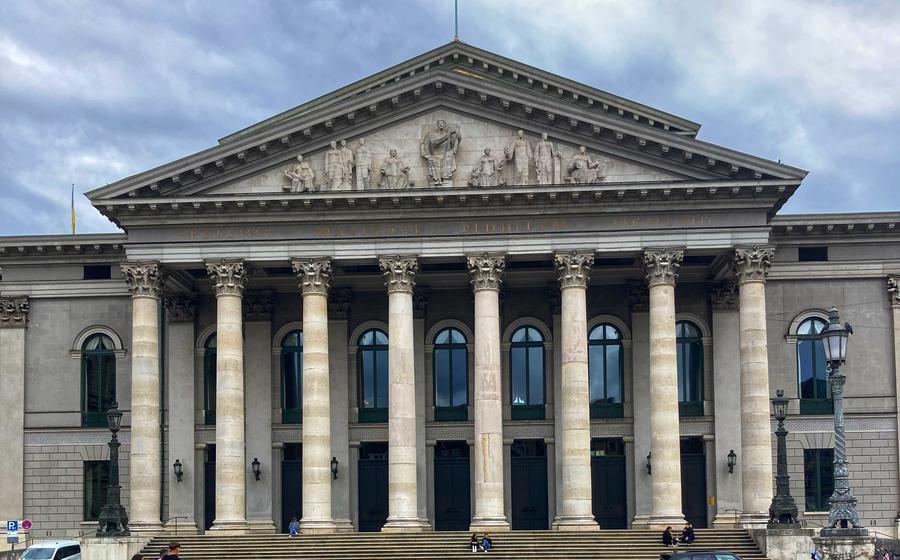
Munich National Theatre
- The Munich National Theatre: A Cultural Gem
- Exploring the Interior of the Theatre
- World-Class Opera and Ballet Performances
- The Genius of Richard Wagner
- A Night at the Theatre: What to Expect
- Booking Tickets and Planning Your Visit
- Guided Tours and Behind-the-Scenes Insights
- The Theatre's Enchanting Surroundings
- Dress Rehearsals and Open Dress Rehearsals
- The Theatre's Rich History and Archives
- Premieres and Special Events
- The Theatre's Educational Programs: Nurturing Future Talent
- The Munich Opera Festival and Other Festivals
- Sustainability and Social Responsibility
- Insider Tip: The Theatre's Secret Garden
The Munich National Theatre: A Cultural Gem
Nestled in the heart of Munich, the Munich National Theatre stands as a testament to the city's rich cultural heritage. Its history dates back to the 19th century, when King Ludwig I commissioned the construction of a magnificent opera house to rival the renowned theaters of Europe. Designed by renowned architect Karl von Fischer, the theatre opened its doors in 1818 and quickly became a hub for world-class opera and ballet performances.
The Munich National Theatre is not just a performing arts venue; it is an architectural masterpiece in its own right. The neoclassical façade, adorned with intricate sculptures and reliefs, reflects the grandeur of the era. The interior is equally impressive, boasting a grand auditorium with opulent decorations, a stunningly painted ceiling, and a state-of-the-art stage.
Exploring the Interior of the Theatre
The Munich National Theatre's interior is a masterpiece of design and craftsmanship. The grand auditorium, with its horseshoe-shaped seating arrangement, can accommodate over 2,000 spectators. The plush red velvet seats, intricate carvings, and gilded balconies create an opulent and inviting atmosphere. The auditorium's ceiling is adorned with stunning frescoes depicting scenes from Greek mythology and the history of Bavaria, painted by renowned artists such as Franz von Lenbach and Wilhelm von Kaulbach. These elaborate ceiling paintings add to the theatre's grandeur and provide a visual feast for the audience.
The orchestra pit, located in front of the stage, is one of the largest and most technologically advanced in the world. It can accommodate up to 120 musicians and is equipped with state-of-the-art acoustics to ensure perfect sound quality. The stage, with its vast dimensions and versatile machinery, allows for elaborate set designs and complex productions. The intricate stage machinery, including hydraulic lifts and revolving platforms, enables seamless scene changes and creates a dynamic and immersive experience for the audience.
World-Class Opera and Ballet Performances
The Munich National Theatre is renowned for its exceptional opera and ballet performances, captivating audiences with their artistic excellence and technical virtuosity. The Bavarian State Opera, resident at the theatre, boasts a world-renowned reputation for its diverse repertoire, encompassing both classical masterpieces and contemporary works. Under the direction of renowned conductors and stage directors, the opera company brings to life some of the most beloved operas, including Mozart's "Don Giovanni," Verdi's "La Traviata," and Wagner's "Der Ring des Nibelungen."
The Bavarian State Ballet, equally celebrated for its artistic achievements, presents an array of classical and modern ballets, showcasing the extraordinary talent of its dancers. Choreographers from around the world create captivating works that fuse tradition with innovation, pushing the boundaries of dance and captivating audiences with their artistic vision.
International collaborations and guest artists further enrich the theatre's programming, bringing together some of the most acclaimed opera singers, conductors, dancers, and choreographers from across the globe. These collaborations foster a vibrant exchange of ideas and artistic influences, resulting in unforgettable performances that leave a lasting impression on audiences.
The Genius of Richard Wagner
Richard Wagner, a legendary composer and one of the most influential figures in the history of opera, was inextricably linked to the Munich National Theatre. His association with the theatre began in 1864 when King Ludwig II of Bavaria, a fervent admirer of Wagner's music, invited him to Munich. Wagner's arrival marked a transformative era for the theatre, elevating it to international prominence.
The Munich National Theatre became the stage for the premieres of some of Wagner's most groundbreaking operas, including "Tristan und Isolde" in 1865 and "Die Meistersinger von Nürnberg" in 186These premieres were momentous events, attracting music enthusiasts from across Europe and establishing Wagner as a revolutionary force in the world of opera.
Wagner's influence extended beyond his own compositions. He played a pivotal role in shaping the artistic direction of the theatre, advocating for innovative staging techniques and emphasizing the importance of the Gesamtkunstwerk, a concept that sought to fuse music, drama, and visual elements into a unified artistic experience.
Wagner's legacy continues to resonate within the walls of the Munich National Theatre. His operas remain a cornerstone of the theatre's repertoire, performed with reverence and dedication. The theatre's commitment to Wagner's artistic vision ensures that his genius continues to inspire and captivate audiences to this day.
A Night at the Theatre: What to Expect
Attending a performance at the Munich National Theatre is a special occasion that requires careful consideration of etiquette and preparation. While formal attire is not mandatory, it is customary to dress elegantly and respectfully. A smart casual dress code is generally appropriate, allowing you to enjoy the performance comfortably while maintaining a sophisticated ambiance.
Performances typically begin between 6 pm and 8 pm, depending on the program. Intermissions, or pauses between acts, offer a brief respite to stretch, mingle with fellow attendees, and refresh with beverages or snacks. The duration of intermissions varies but usually lasts around 20 to 30 minutes, allowing ample time to unwind before the performance resumes.
The theatre boasts a range of amenities to enhance your experience. Cloakrooms are available to store coats and other belongings, ensuring a comfortable and unencumbered viewing experience. Refreshments, including drinks and snacks, can be purchased at the theatre's bars and cafés, providing a convenient way to replenish your energy during the performance.
Booking Tickets and Planning Your Visit
To ensure a seamless experience at the Munich National Theatre, advance booking is highly recommended. Tickets can be purchased online through the theatre's official website or via reputable ticketing platforms. Prices vary depending on the performance, seat category, and date. For a truly immersive experience, opt for seats in the orchestra or dress circle.
When planning your visit, consider the duration of performances, which typically range from two to four hours, including intermissions. Intermissions offer an opportunity to stretch your legs, grab refreshments, and mingle with fellow theatre enthusiasts. The theatre provides a range of facilities for visitors, including cloakrooms, restrooms, and a bar serving light snacks and beverages.
Guided Tours and Behind-the-Scenes Insights
The Munich National Theatre offers guided tours that provide visitors with an exclusive glimpse into the world behind the curtain. Led by knowledgeable guides, these tours delve into the theatre's rich history, captivating stories, and hidden corners.
Highlights of the tour include visits to the costume workshops, where the intricate costumes for opera and ballet productions are meticulously crafted. Visitors can marvel at the skill and artistry that goes into creating these elaborate garments, which bring the characters to life on stage.
Another highlight is a peek into the backstage areas, where the magic of theatre comes together. Visitors can explore the labyrinth of corridors, dressing rooms, and technical spaces, gaining insights into the complex coordination that makes each performance a success.
These guided tours are available in various languages, catering to international visitors. Advance reservations are recommended to secure a spot, as these tours are popular and often sell out quickly. Tour schedules vary, so it's advisable to check the theatre's website or inquire at the box office for availability.
The Theatre's Enchanting Surroundings
The Munich National Theatre is not only a cultural gem but also a part of the city's vibrant urban fabric. Situated in the heart of Munich's historic center, the theatre is surrounded by notable landmarks and attractions.
Strolling from the theatre's grand entrance, visitors can explore the majestic Residenz, the former royal palace of the Wittelsbach dynasty, which houses a treasure trove of art and history. Just a short walk away lies the Englischer Garten, one of the largest urban parks in the world, offering serene landscapes, picturesque streams, and a Japanese teahouse.
The theatre's convenient location makes it easily accessible by public transportation. Several underground (U-Bahn) and tram lines stop nearby, connecting visitors to other parts of the city. For those arriving by car, there are several parking garages in the vicinity, ensuring a hassle-free visit.
Dress Rehearsals and Open Dress Rehearsals
Attending dress rehearsals and open dress rehearsals at the Munich National Theatre offers a unique opportunity to experience world-class performances at reduced prices. Dress rehearsals are closed to the public, but occasionally, the theatre opens these rehearsals to a limited audience, allowing them to witness the final preparations and adjustments before the premiere. Open dress rehearsals, on the other hand, are open to the public and provide a sneak peek into the upcoming performance. These rehearsals are typically held a few days before the premiere and allow audiences to experience the production in its near-final form.
Tickets for dress rehearsals and open dress rehearsals are usually available at a discounted rate, making them an attractive option for budget-conscious theatergoers. However, it's essential to note that these rehearsals are not fully polished performances, and there may be occasional interruptions or changes as the production team makes final adjustments. Nevertheless, attending a dress rehearsal or open dress rehearsal offers a unique glimpse into the creative process and provides an opportunity to witness the dedication and artistry of the performers and production team.
To secure tickets for dress rehearsals or open dress rehearsals, it's advisable to check the theatre's website or contact the box office directly. Availability may be limited, and advance booking is recommended to avoid disappointment.
The Theatre's Rich History and Archives
The Munich National Theatre has a rich and illustrious history, which is meticulously preserved and showcased through its extensive archives and exhibitions. Visitors can delve into the theatre's past through captivating displays of costumes, set designs, and historical documents that bring to life the magic and grandeur of past productions.
The theatre's archives serve as a treasure trove for researchers, scholars, and enthusiasts alike. They house a vast collection of materials, including production records, correspondence, photographs, and programs, offering a comprehensive insight into the theatre's artistic journey.
For those seeking a deeper understanding of the theatre's heritage, guided tours are available, providing exclusive access to backstage areas, costume workshops, and the theatre's historical collection. These tours offer a glimpse into the intricate workings of the theatre, revealing the dedication and artistry that goes into every production.
Premieres and Special Events
The Munich National Theatre is renowned for hosting significant premieres and special events that attract opera and ballet enthusiasts from around the world. These events often feature highly anticipated new productions, world-class artists, and exclusive performances.
Premieres at the Munich National Theatre hold a special place in the theatre's history and repertoire. New operas and ballets are unveiled to the public, showcasing the creativity and innovation of contemporary composers, choreographers, and directors. These premieres are eagerly awaited by critics and audiences alike, offering a glimpse into the future of the performing arts.
In addition to premieres, the theatre also hosts special events such as galas, anniversaries, and benefit performances. These events often feature a star-studded lineup of artists, exclusive performances, and one-of-a-kind experiences. Gala performances, in particular, are lavish affairs that celebrate the theatre's rich history and artistic achievements, bringing together renowned performers and showcasing the theatre's finest productions.
Tickets for premieres and special events are highly sought after and can be difficult to obtain. Advance booking is strongly recommended to secure your seat for these exclusive performances. The theatre's website and box office provide up-to-date information on upcoming premieres, special events, and ticket availability.
The Theatre's Educational Programs: Nurturing Future Talent
The Munich National Theatre recognizes the importance of fostering the next generation of artists and arts enthusiasts. To this end, it offers a range of educational programs designed to inspire, educate, and engage individuals of all ages.
Aspiring artists can participate in workshops, lectures, and masterclasses led by renowned professionals from the world of opera, ballet, and theater. These programs provide invaluable insights into the artistic process, performance techniques, and the unique challenges of working in the performing arts.
The theatre also extends its educational outreach to schools and youth groups through tailored programs that introduce students to the magic of live performance and the diverse artistic disciplines represented at the Munich National Theatre. These initiatives aim to cultivate a lifelong appreciation for the arts and encourage the pursuit of creative endeavors.
Additionally, the theatre offers opportunities for the public to engage with its artistic community through lectures, panel discussions, and backstage tours. These events provide a unique glimpse into the inner workings of the theatre and foster a sense of connection between the institution and its audience.
The Munich Opera Festival and Other Festivals
The Munich Opera Festival, held annually in June and July, is a major highlight in the city's cultural calendar. This prestigious event showcases world-renowned opera productions, attracting opera enthusiasts from around the globe. The festival features a diverse program of classic and contemporary operas, performed by the Bavarian State Opera and renowned guest artists.
In addition to the Munich Opera Festival, the theatre collaborates with other renowned festivals and cultural institutions to present a variety of events throughout the year. These collaborations bring together artists from different disciplines, creating unique and unforgettable performances. The theatre's diverse programming includes dance festivals, contemporary music concerts, and interdisciplinary productions that push the boundaries of artistic expression.
International collaborations are a defining feature of the Munich National Theatre. The theatre regularly invites renowned opera companies, orchestras, and artists from around the world to perform on its stage. These collaborations not only enrich the theatre's repertoire but also foster cultural exchange and promote international understanding through the universal language of music and the arts.
Sustainability and Social Responsibility
The Munich National Theatre recognizes the importance of sustainability and social responsibility in its operations. It actively takes measures to reduce its carbon footprint by using energy-efficient lighting and heating systems, promoting recycling and waste reduction programs, and supporting sustainable transportation options for its employees and visitors.
The theatre also engages in social outreach initiatives to promote accessibility and inclusivity. It offers discounted tickets for students, seniors, and individuals with disabilities, and organizes educational workshops and programs for underprivileged communities. Furthermore, the theatre collaborates with local charities and organizations to support social causes and contribute to the well-being of the Munich community.
By embracing sustainability and social responsibility, the Munich National Theatre sets an example for other cultural institutions and demonstrates its commitment to creating a positive impact on the environment and the community it serves.
Insider Tip: The Theatre's Secret Garden
Amidst the grandeur and opulence of the Munich National Theatre lies a hidden gem—a secret garden that offers a tranquil respite from the bustling city. Nestled within the theatre complex, this enchanting oasis invites visitors to immerse themselves in nature's beauty and serenity.
Stroll along the winding paths, surrounded by vibrant flowers, lush greenery, and the gentle murmur of water fountains. Discover secluded benches nestled among fragrant rose bushes, where you can relax and soak in the tranquility of the garden.
The secret garden is a testament to the theatre's commitment to creating a harmonious balance between art and nature. It serves as a sanctuary for artists, staff, and visitors alike, providing a space for contemplation, inspiration, and rejuvenation.
To access this hidden treasure, simply inquire at the theatre's information desk. The garden is open to the public during the day, offering a unique opportunity to experience a different side of the Munich National Theatre.
So, after immersing yourself in the world of opera and ballet, take a moment to explore the theatre's secret garden. Let the beauty of nature soothe your senses as you reflect on the magic and wonder you've experienced within the walls of this iconic cultural institution.
